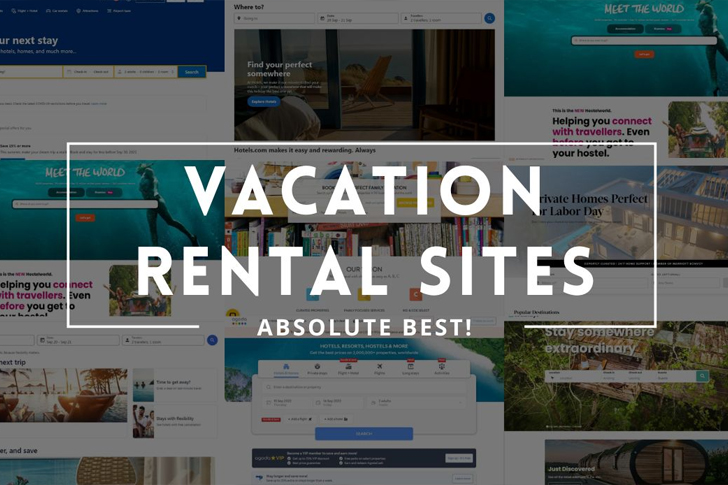Options for Vacation Rental Websites
Introduction: The Evolving Landscape of Vacation Rental Websites
In recent years, the vacation rental market has experienced significant growth, mirroring the global increase in tourism and changes in how travelers seek accommodation. Websites dedicated to vacation rentals have not only diversified the lodging industry but have also provided property owners with novel ways to generate income. This article explores some of the leading platforms for listing and booking vacation rentals, backed by data and important considerations for both hosts and guests.

The Rise of Vacation Rental Platforms
Technological advancements and shifts in consumer behavior have fueled the rise of vacation rental platforms. According to a report from Grand View Research, the global vacation rental market size was valued at approximately $87.09 billion in 2019 and is expected to expand at a compound annual growth rate (CAGR) of 3.4% from 2020 to 2027. Such growth is driven by the increasing preference among travelers for affordable, homely, and safe accommodations offered by vacation rentals.
Top Vacation Rental Platforms
Several platforms dominate the vacation rental market, each offering unique features and benefits to its users.
Airbnb
Perhaps the most well-known of all, Airbnb has transformed the landscape of vacation rentals. Founded in 2008, Airbnb boasts millions of listings worldwide. It caters to a diverse range of preferences, offering everything from single rooms to entire homes. One of the key attractions of Airbnb is its user-friendly platform and the emphasis on creating a community among users through reviews and interactions.
VRBO (Vacation Rentals by Owner)
Focused exclusively on entire homes, VRBO is ideal for families and larger groups looking for more space and privacy. Owned by Expedia Group, VRBO offers a different model from Airbnb by mainly listing entire properties and catering to longer stays, which can be more lucrative for property owners focused on such markets.
Booking.com
Originally famous for hotel bookings, Booking.com has significantly expanded its portfolio to include vacation rentals. Its interface is praised for being intuitive and provides extensive filtering options to help both guests and hosts maximize their utility from the platform. Moreover, Booking.com integrates seamlessly with other types of travel bookings like flights and car rentals, offering a comprehensive travel booking experience.
Emerging Platforms and Niche Markets
While giants like Airbnb, VRBO, and Booking.com dominate, several niche platforms cater to specific audiences or uphold certain values, like sustainability.
Homestay.com
Homestay.com differentiates itself by offering stays in a local’s home, where the host is present. This appeals to travelers looking for cultural immersion and a more personal connection with their destination.
EcoBnb
This platform focuses on accommodations that are sustainable and eco-friendly, catering to the growing segment of environmentally conscious travelers. Properties listed on EcoBnb have to meet specific sustainability criteria, thus ensuring that hosts and guests align with the principles of eco-tourism.
Choosing the Right Platform: Factors to Consider
Selecting the right vacation rental website can depend on various factors including fees, market audience, ease of use, and supplemental services. Here’s a breakdown of some key considerations:
Service Fees
Most platforms charge a commission from hosts and service fees from guests. Airbnb, for example, charges hosts typically 3% per booking and guests anywhere from 0%-20%. VRBO offers a similar structure but with the option for hosts to pay a yearly subscription to list their property instead of per-booking fees.
User Experience
The ease with which users can navigate platforms, from setting up listings as a host to booking accommodations as a guest, significantly impacts user retention. Airbnb and Booking.com invest heavily in user interface and experience design, making them leaders in this space.
Security and Support
Vacation rental platforms must also ensure the security of transactions and the availability of customer support. Platforms like Airbnb have established sophisticated systems to verify users and offer 24/7 customer support to assist with issues that arise during stays.
Conclusion: The Future of Vacation Rentals
The vacation rental industry continues to evolve, driven by technology and changing consumer preferences. As the industry grows, so does the sophistication of the platforms facilitating these rentals. For both hosts and guests, choosing the right platform involves balancing costs, ease of use, market reach, and supplemental features. As the market expands, the potential for more tailored platforms catering to niche markets or values, like sustainability, also increases, reflecting broader trends in global travel and consumer priorities.
In conclusion, whether it is a mainstream giant like Airbnb or a niche player like EcoBnb, the success of a vacation rental platform hinges on how well it aligns with the needs and values of its users. As the market grows, the platforms that can innovate and adapt to the ever-changing landscape of travel and accommodation will likely lead the industry into the future.







Recent Comments